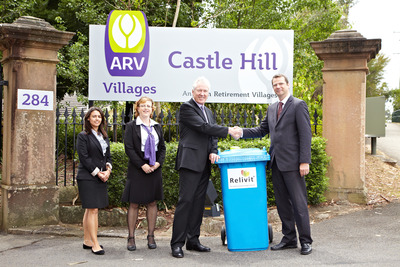Recycling hygiene waste cuts costs and carbon emissions
On 20 November, in an innovative move to reduce its environmental impact and cut costs, Anglican Retirement Villages (ARV) signed a letter of intent with recycling company Relivit. This measure will help bring Relivit’s recycling process to Australia. ARV will then be able to tackle its largest and most expensive waste stream - continence pads - helping ARV reach its target of recycling 80% of its waste by 2014.

The environmental savings achieved from recycling continence pads, disposable nappies or female hygiene products (or absorbent hygiene waste) might be thought to be small, but in fact, the benefits from recycling this waste will be felt by the entire community. Sydney alone currently produces almost 100,000 tonnes of absorbent hygiene waste each year. If sent to landfill, this waste produces the same amount of greenhouse gases as 37,500 cars travelling 15,000 km each year.
“As well as having a responsibility to provide high-quality and cost-effective care, Anglican Retirement Villages has a responsibility towards environmental sustainability,” said ARV Procurement Manager Terry James. “By signing up with Relivit, we’re excited to see our pads being recycled. We understand that more than 95% of this waste will be directed away from landfill, halving the carbon emissions. We will also be able to reduce our waste management costs at a time when landfill fees are rising sharply.”
“Relivit is working with forward thinking organisations such as ARV to help Australia’s environmental and economic sustainability,” said Gareth Williamson, Managing Director of Relivit. “ARV is the first of a number of aged care providers that have signed a letter of intent with us. We believe that resources should not be lost to landfill, and ARV’s support will enable us to convert the plastics and wood fibre into new products.”
In fact, nine out of Sydney’s 10 largest aged care organisations have signed up with Relivit. ARV and these organisations are now working with Relivit to further investigate the service, with a view to finalising contracts in early 2013.
“It is the desire of organisations such as ARV to take our service that will allow Relivit to commence operations in 2013. This will then open up opportunities for councils, childcare centres and households to being able to recycle this difficult waste stream, further reducing emissions and waste to landfill,” Williamson continued.
Relivit plans to commence operating its first AHW recycling plant in late 2013. The Western Sydney plant will be able to process 25,000 tonnes of AHW each year. It will also recycle sanitary waste collected by washroom management providers such as Pink Hygiene Solutions.
How Australia can increase its circularity rate
An expert said the solution could lie in developing onshore processing plants and creating...
Scouts SA secures future of its recycling centres
Scouts SA has partnered with Container Deposit Scheme specialist Return-It to grow its Scout...
Mining waste provides strong boost to concrete construction
Flinders University researchers are turning mining waste into a tool for sustainable...








